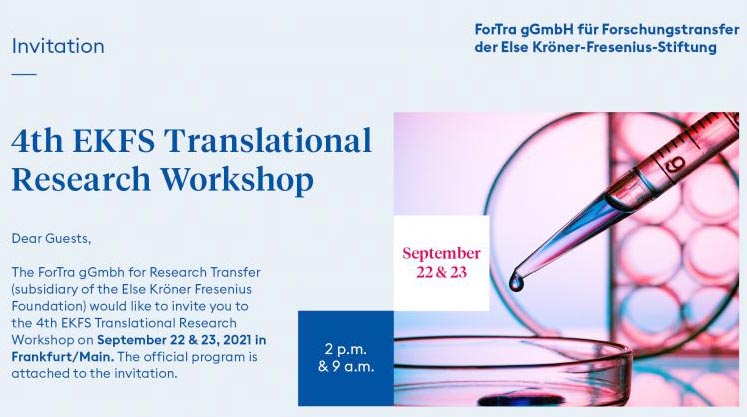Translational Research Workshop: How to Improve Translational Medicine

© EKFS
The ForTra gGmbh for Research Transfer (subsidiary of the Else Kröner Fresenius Foundation) would like to invite to the 4th EKFS Translational Research Workshop on September 22 & 23, 2021 in Frankfurt/Main.
At the workshop distinguished experts will discuss the important challenge “How to Improve Translational Medicine”. They will present possible solutions to increase the chances of biomedical products reaching the market and benefiting patients.
Come and join us in Frankfurt to discuss the possibilities for empowering translational medicine and learn about a variety of tools to support and finance your translational research project on its way to clinical application.
Attending the workshop is free of charge, but you need to register in advance at the following email address: translatorik@ekfs.de
The limited seating will be allocated according to the time of registration (first come, first served).
What: How to Improve Translational Medicine
Date: September 22, 2 p.m. & September 23, 9 a.m.
Target audience: for physicians and scientists interested in the successful implementation of their projects on its way to clinical application. The lectures and discussions will be held in English.
Where: Congress Center Messe Frankfurt am Main, Entrance: Ludwig-Erhard-Anlage 1, 60327 Frankfurt am Main, Germany
Wissenschaftliche Ansprechpartner:
Queries: Prof. Dr. Martin Zörnig, +49 (6172)-8975 12
Registration: translatorik@ekfs.de
Weitere Informationen:
https://ekfs.de/en/current-topics/events/4th-translational-research-workshop-how…
Media Contact
All latest news from the category: Seminars Workshops
Newest articles

First-of-its-kind study uses remote sensing to monitor plastic debris in rivers and lakes
Remote sensing creates a cost-effective solution to monitoring plastic pollution. A first-of-its-kind study from researchers at the University of Minnesota Twin Cities shows how remote sensing can help monitor and…

Laser-based artificial neuron mimics nerve cell functions at lightning speed
With a processing speed a billion times faster than nature, chip-based laser neuron could help advance AI tasks such as pattern recognition and sequence prediction. Researchers have developed a laser-based…

Optimising the processing of plastic waste
Just one look in the yellow bin reveals a colourful jumble of different types of plastic. However, the purer and more uniform plastic waste is, the easier it is to…



